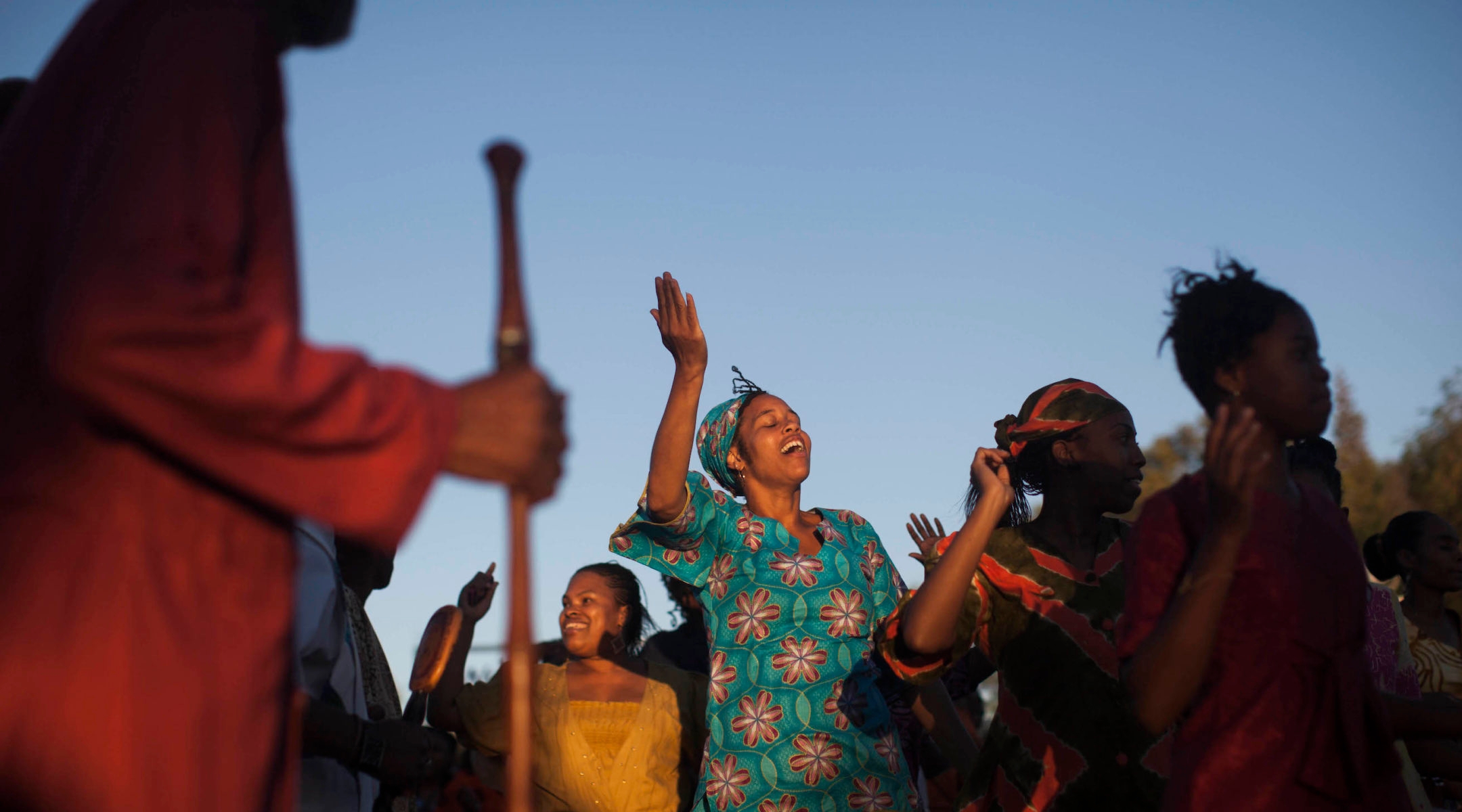Ben Ammi Ben-Israel, the spiritual leader of the African Hebrew Israelites, a group of African-Americans who, believing they were descendants of the biblical tribe of Judah, settled in Israel in the 1960s and ’70s, died last week. He was 75.
Ben-Israel’s community now numbers about 3,000, with most living in the Negev town of Dimona. While not officially recognized as Jewish, the Black Hebrews, as they are commonly known, make up a small subculture in Israel. Their history there has been somewhat turbulent.
Three weeks after the group’s first immigrants arrived in Israel from Chicago by way of Liberia, JTA reported that the community was “apparently getting along very well in their new environment,” although “their eventual status as immigrants remains undecided.” The report went on:
Within three days of their arrival at Dimona all families found work at the nearby textile plants and in local shops and factories, according to the Jewish Agency. Their children are already attending school. All of them have Hebrew names and have some knowledge of the Hebrew language.
The group arrived penniless at Lydda Airport from Liberia. They told Israeli officials they had tried to set up a Jewish communal settlement in the West African country but were made to feel “unwanted” and decided to go to Israel “where we belong.”
But tensions increased as more Black Hebrews came. Twenty arriving in October 1971 were denied entry because Israeli authorities “said they had one-way tickets and insufficient funds to stay in Israel as tourists.” Black Hebrews who had come to the airport to greet the new arrivals “protested vigorously” and “claimed that they were the true Hebrews, ‘sons of Abraham, Isaac and Jacob’ and that the country of Israel was promised them by God and belongs only to them.”
Over the next few years, the Israeli government and the Black Hebrews clashed over whether they should be eligible for citizenship or deported. The government deported some, while other deportation efforts were successfully appealed to the Supreme Court.
In 1979, a special Knesset committee recommended establishing an agricultural village in the Negev for the Black Hebrews “and providing them with the means to construct their own community.” The recommendations followed complaints by several Dimona residents who had appealed to the government, claiming the Black Hebrews “were having an adverse effect” on city and that they “were conducting services and carrying on practices similar to that of the notorious People’s Temple in Jones-town, Guyana.”
In 2003, when Israel granted 2,500 Black Hebrews “permanent resident” status, JTA gave an overview of the group’s history in the country to date:
… The Black Hebrews’ path toward Israeli citizenship has been long and arduous.
Originally offered citizenship under the Law of Return in 1969, the community’s status later was challenged and revoked.
From 1973 through the early 1990s, the community had no legal status, and many members of the group — who had renounced their U.S. citizenship — were left stateless.
As a result, Black Hebrews could not hold legal jobs, send their children to Israeli schools or utilize national health care services.
The Black Hebrews’ cause was not helped by their insistence that they were the true Jews and that the Israelis were usurpers. As their case made its was through Israeli courts, they mounted a campaign against the state that many saw as vitriolic and anti-Semitic.
The community’s newspapers compared Israelis to Nazis and included images of money-grubbing Jews.
Despite their struggles for acceptance, the Black Hebrews established a fast growing community. Members say it is deeply rooted in Biblical teachings, though they reject latter-day interpretations of the Bible, including such injunctions as the rabbinic prohibition against polygamy.
Adherents follow a strictly vegan diet; eschew caffeine, alcohol, drugs and cigarettes; and experiment with no-salt days, sugar-free weeks and raw-food weeks …
In 1980, the community moved from overcrowded housing in Dimona to an abandoned absorption center nearby, which they cleaned and beautified.
The call their current environs the Village of Peace or the Island of Sanity, and it includes a vegan restaurant that is open to the public.
Community members say they welcome Israeli visitors and are involved in Dimona civic life.
Also in 2003, the community hosted pop star Whitney Houston and her then-husband, Bobby Brown, on their tour of Israel.
Perhaps Houston’s visit inspired Ahtaliyah Pierce, a Black Hebrew member who in 2013 achieved a new milestone for the community: At 17 she “reached the semifinals on Israel’s edition of ‘The Voice,’ a reality show in which emerging singers compete.”
JTA has documented Jewish history in real-time for over a century. Keep our journalism strong by joining us in supporting independent, award-winning reporting.






